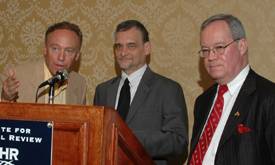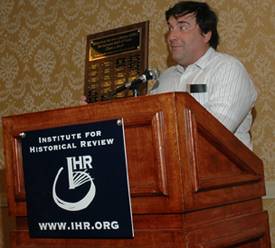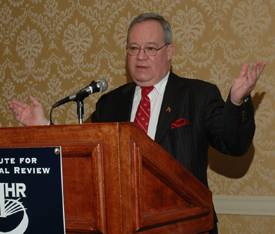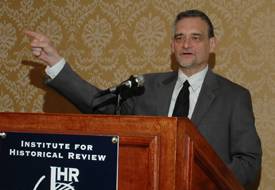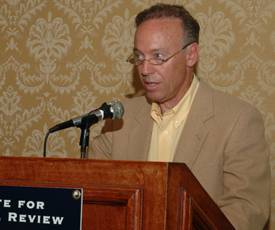First-Rate Talks Mark Successful IHR Meeting
News from the Institute for Historical Review
|
With an appreciative audience and first-rate talks by three seasoned speakers – Mark Weber, Paul Fromm and Mark Green — the IHR meeting on Saturday evening, May 24, 2008, in Costa Mesa, California, was a memorable event. Among the attendees was a married couple who had flown in from Eugene, Oregon. Rich Salzer, a long-time friend of the IHR who runs the “Historical Review Library” in Virginia, traveled across the country to present a handsome plaque to IHR director Weber that honors notable revisionist historians and activists. Paul Fromm, the first featured speaker, spoke with verve and good humor about the battle for on-line free speech in Canada. As director of the Canadian Association for Free Expression, he has been at the forefront in the struggle against Canada’s repressive “Human Rights Act.” He has been active in defending Ernst Zundel, Marc Lemire and others who were charged under the Act for having posted writings that are “likely to expose a person or persons to hatred or contempt by reason of the fact that that person or those persons are identifiable on the basis of a prohibited ground for discrimination [race, ethnicity, religion].” The terms “likely” and “contempt” in this law are so imprecise, said Fromm, that the accused in such cases has no effective defense. Moreover, he noted, it simply does not matter in such cases if the supposedly “offensive” writing is factually true. Remarkably, on-line writings that are forbidden under the “Human Rights Act” are legal when published in a book or newspaper. For years, said Fromm, the battle for on-line free speech has been a seemingly hopeless “rear guard” fight. But during the past year the tide has shifted dramatically, above all because some prominent mainstream writers have been charged with violating the Act. Almost no one in Canada is now willing publicly to defend the Act. There’s now an optimistic “feeling of momentum,” he said. Mark Weber, in a closely reasoned and well-referenced lecture, dismantled the myth of World War II as a “good war” clash between virtue and evil. (The full text of the IHR director’s talk, “The ‘Good War’ Myth of World War Two,” is posted here.) “Whatever doubts or misgivings Americans may have had about their country’s role in Iraq, Vietnam, or other overseas conflicts,” he said, “most accept that the sacrifices made by the US in World War II, especially in defeating Hitler’s Germany, were entirely justified and worthwhile.” For more than 60 years, he went on, this view has been reinforced in motion pictures, on television, by teachers, and by political leaders. But this reverential portrayal, he explained, “does not hold up under close examination.” In 1941, Weber noted, the United States pledged that it was fighting for freedom and self-government for “all peoples.” The emptiness of this solemn pledge is “hardly surprising, given that America’s two most important military allies in the war were Great Britain and the Soviet Union – that is, the world’s foremost imperialist power, and the world’s cruelest tyranny.” The “Big Three” Allied leaders – US President Roosevelt, British Prime Minister Churchill, and Soviet premier Stalin – “accomplished what they accused the Axis leaders of Germany, Italy and Japan of conspiring to achieve: world domination.” “Many Americans are understandably outraged by the deceit and falsehoods of President George W. Bush and his administration in seeking public support for the US invasion of Iraq in 2003,” said Weber. But “presidential deception to justify war did not start with him. Americans who express admiration for the US role in World War II, and for Franklin Roosevelt’s presidential leadership, have little moral right to complain when presidents follow his example and lead the country into war by breaking the law, subverting the Constitution, and lying to the people.” |
|
|
Mark Green, in a succinct talk entitled “Media Mischief, Anti-Semitism, and Moral Clarity,” explained why the dread label of “anti-Semitism” is both inaccurate and bogus. Green, a one-time television show host, is author-editor of Persecution, Privilege and Power, a just-published collection of thirty articles on Zionist and Israeli history, the impact of the pro-Israel lobby, and the US role in the Middle East. Included in the book are writings by Kevin MacDonald, Charley Reese, Joe Sobran, Mark Weber, James Petras and Alison Weir. In our country’s intellectual and cultural life, said Green, “the major taboos still include non-conforming opinions about Israel-Palestine, the origins and experiences of World War II, and especially the Holocaust, and the root causes of MidEast ‘terrorism’.” He said that he has “both loved and hated people in my life who were Jewish. But this is irrelevant to the discussion of organized Jewry. That’s why the term anti-Semitism is such junk.” The simple reality, he went on, is that organized Jewry is “a powerful political force.” American media coverage of the Israel-Palestine conflict is biased and unbalanced, said Green, giving much more attention to deaths of Jews than of non-Jews. “This kind of reporting has real impact and real meaning: namely, that Jewish life should be considered more precious and most important to Americans than that of other ethnic groups.” Green urged continued vigilance and struggle. “We have to keep chipping away, unmasking the falsehoods and glaring inconsistencies within the Zionist narrative.” A lively question and answer period, followed by a few closing remarks, concluded the meeting. | |
